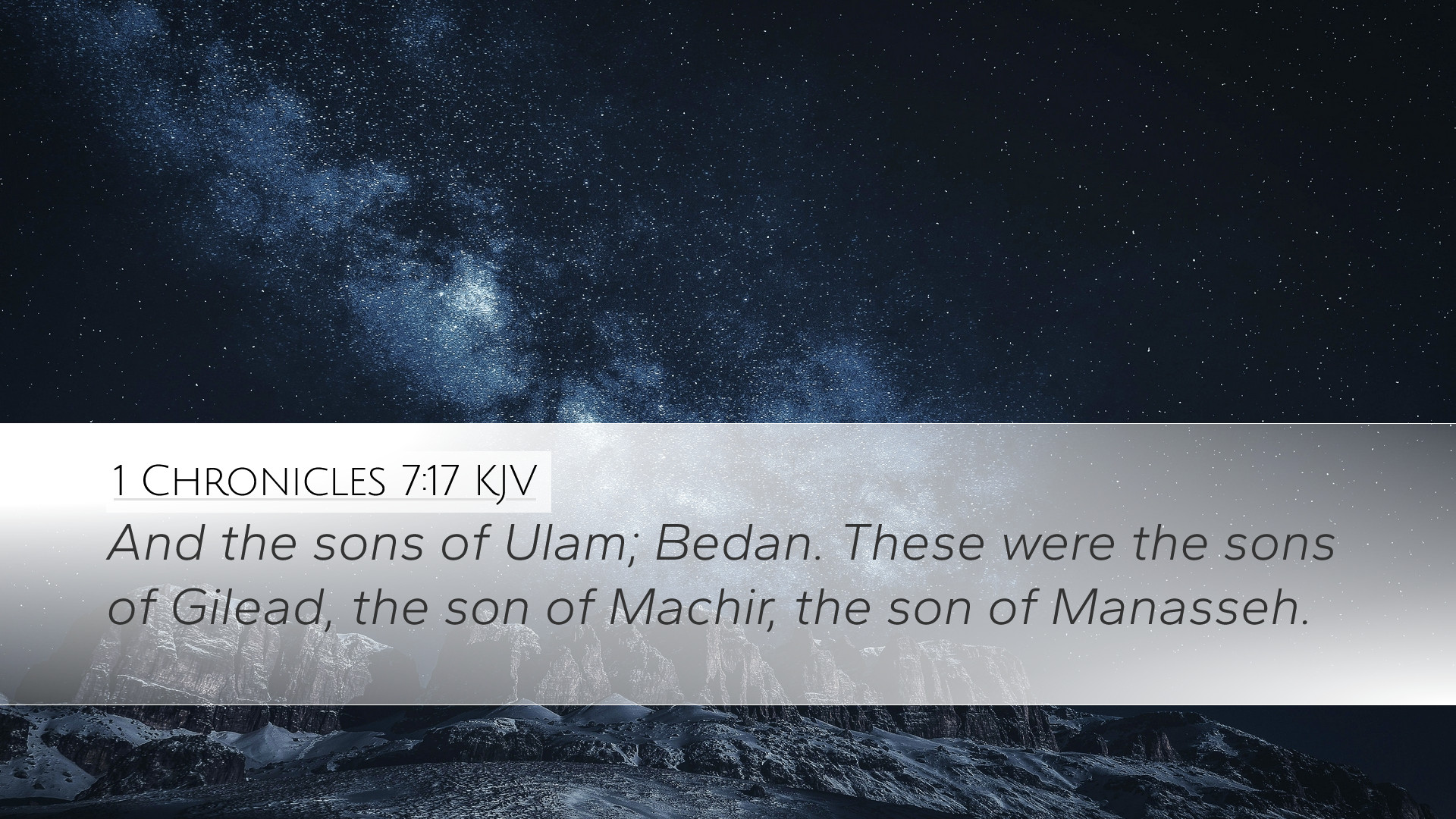Commentary on 1 Chronicles 7:17
1 Chronicles 7:17 states, "And the sons of Ephraim; Shutelak, and Bered his son, and Tahath his son, and Eladah his son, and Tahath his son." This verse, as part of the genealogy of the tribes of Israel, particularly focuses on the lineage of Ephraim, one of the sons of Joseph. The genealogical records in the Chronicles not only serve to trace familial connections but also to highlight the faithfulness of God in fulfilling His promises to His people.
Context and Significance
The book of Chronicles addresses the post-exilic community in Israel, aiming to provide them with a sense of identity and continuity. The meticulous records offer insights into the history of the tribes of Israel, establishing a profound understanding of their significance in God's redemptive plan.
Ephraim, being one of the leading tribes, is pivotal in Israel's history. The genealogy here not only identifies individuals but also recalls the divine blessings conferred upon Ephraim and the historical events linked to his descendants.
Insights from Public Domain Commentaries
Matthew Henry's Commentary
Matthew Henry emphasizes the importance of genealogies in Scripture, as they show how God has preserved a remnant for Himself throughout generations. He notes that the names listed, particularly those of Ephraim's descendants, reflect the continuing heritage of faith and the fulfillment of God’s covenant promises. Each name in the genealogy serves as a witness to God’s providence and the unfolding of redemptive history.
Henry also connects this genealogy to themes of preservation and inheritance. Ephraim’s lineage is symbolic of the blessings given to the tribes of Israel, particularly the promise of land and a people. He suggests that understanding these families helps contemporary believers grasp their own spiritual ancestry and the faithfulness of God across generations.
Albert Barnes' Notes
Albert Barnes attributes significance to the names mentioned in this verse, noting that they reflect both personal identity and tribal unity. He points out that Ephraim was often seen as a symbol of strength and prosperity, and the mention of his descendants illustrates the ebb and flow of tribal fortunes throughout Israel's history.
Barnes further elaborates on the familial ties that connect these individuals, affirming that each name represents a unique life story woven into the larger narrative of Israel. He stresses that such genealogies serve as a reminder of the importance of community and familial bonds, urging readers to appreciate their own spiritual heritage.
Adam Clarke's Commentary
Adam Clarke provides an in-depth analysis of the names and their meanings within this passage. He points out that the names of Ephraim’s descendants carry significant meanings that reflect their character and the historical context of the times they lived in. Each individual mentioned had a role in maintaining the faith and tradition of the Israelite people.
Clarke also discusses the potential theological aspects of the verse, suggesting that the genealogical record serves to illustrate God’s faithfulness in keeping His promises to Ephraim and, consequently, to the nation of Israel. He highlights that genealogy in the biblical narrative provides insight into God’s overarching plan for redemption and the continuity of His covenant people.
Theological Themes
- Divine Faithfulness: This passage reminds readers of God’s unwavering faithfulness throughout generations.
- Covenant Heritage: The genealogy emphasizes the rich heritage of the Israelites, rooted in the covenant promises made by God.
- Community and Identity: The names signify not just individuals but also a connected community that has a shared identity in God.
- Legacy of Faith: Each name represents a legacy of faith, urging current believers to consider their own spiritual lineage.
Conclusion
In summary, 1 Chronicles 7:17 serves as a crucial part of the genealogical records that chronicle the heritage of Ephraim and, by extension, all of Israel. The insights gleaned from the commentaries of Matthew Henry, Albert Barnes, and Adam Clarke reveal layers of theological significance and encourage believers today to reflect on their own place in the ongoing story of God’s people. The careful study of such passages enhances the understanding of Scripture and affirms the importance of genealogy in revealing God’s faithfulness across time.


